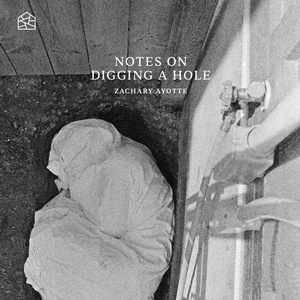While renovating their Edmonton house, writer Zachary Ayotte and his partner discover water—“Just moisture… Like oil across a teenaged forehead”—seeping into their basement. “[F]eeling like a cartoon character standing meekly with pockets pulled inside out,” since he doesn’t have the cash for yet another home-improvement project, Ayotte decides to dig the hole himself to expose the face of the foundation rather than have this essential work consigned to an unskilled worker by a contractor: “It’s a job anyone can do. By definition, I was qualified.”
Pondering his bad back and human frailty, Ayotte excavates the deeper meanings of “essential and “unskilled,” among other tags, that the more-well-to-do-and-educated assign to physical labour in Notes on Digging a Hole, a chapbook from Glass House Press. Created by poets Jason Purcell and Matthew Stepanic, who also own Edmonton’s Glass Bookshop, this imprint styles itself as “a little company doing big things.” Ayotte substantiates such happy talk with an incisively written and designed “small book” that’s a pleasure to hold. The black-and-white and colour photographs he took of his grimy hands and feet, which I lingered over while parsing his text, bear witness to how bruising digging a hole can be: work where “the tops of men’s heads barely [break] ground level.” There’s even a photo (detailed on the cover) of the author lying in the fetal position and swaddled in a shroud in said hole, as if he’d dug his own grave. “The fear [of death]… helps feed our ability to justify the harm that our systems [do to] some bodies, increasing precarity while limiting compensation.” Flash forward a few light years and it could look as if he’s only now been uncovered, miraculously preserved in self-sacrificial purity, during someone else’s paradigm-shifting perimeter dig.
Setting aside my homoerotic fantasies about the future, it’s really Ayotte’s concern about precarity and compensation that drives his delving into our attitudes toward the people who perform labour. The sweat equity he’s obtained gives him the intellectual muscle to shovel aside hypocrisies that the pandemic has brought to light as we continue to pay lip service to the badly paid workers who’ve kept our hospitals and supermarkets open. Ayotte employs the ideas of Michel Foucault, Judith Butler and Lucy R. Lippard like a spade to dig past the slag while he temporarily shoulders the back-breaking work others rise to every day to earn their bread. In Notes on Digging a Hole, he asks us to face up to “what we are truly asking when it is bodies we ask people to give.” His dig is a one-off, and Ayotte leaves us not knowing if his basement is now dry.
John Barton is an editor and the author of 12 books of poetry.


